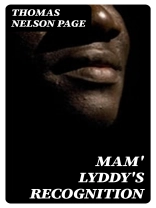In ‘Mam’ Lyddy’s Recognition, ‘ Thomas Nelson Page navigates the intricacies of Southern identity and familial bonds against the backdrop of post-Civil War America. The novella, steeped in a rich, evocative prose, reflects Page’s masterful use of dialect and symbolism, painting a vivid picture of a society grappling with loss and rebirth. The narrative intertwines themes of race, heritage, and the often-unspoken tensions that linger in the shadow of the Old South, revealing the complexities of both the African American and white Southern experiences during this transformative period. Thomas Nelson Page, a prominent Southern writer and lawyer, drew upon his own experiences and the cultural milieu of his upbringing in Virginia to craft this poignant tale. His background allowed him to explore the nuances of Southern life with authenticity, reflecting his deep sensitivity to the historical context of the Reconstruction era. Page’s works often grapple with the South’s troubled legacy, revealing his commitment to understanding and chronicling the region’s socio-political landscape through a literary lens. Readers seeking an evocative exploration of Southern life, identity, and the personal impacts of historical upheaval will find ‘Mam’ Lyddy’s Recognition’ a compelling read. Page’s nuanced storytelling and lyrical prose invite introspection, making it an essential text for those interested in the complexities of American literature and history.
Sobre o autor
Thomas Nelson Page (1853–1922) was an American writer and lawyer renowned for his depiction of Southern plantation life. Born in Hanover County, Virginia, to an elite planter family, Page’s upbringing amidst the remnants of the antebellum South palpably influenced his literary work. Often criticized for his idealistic portrayal of the Old South and the Lost Cause of the Confederacy, Page’s prose nonetheless offers valuable insights into the post-Civil War Southern mentality. ‘Mam’ Lyddy’s Recognition’ is among his lesser-known works, yet it still embodies his characteristic themes of Southern honor, tradition, and racial paternalism.
Page attended Washington College (now Washington and Lee University), where he nurtured his affinity for storytelling. His literary career blossomed with the publication of his collection ‘In Ole Virginia: Marse Chan and Other Stories’ (1887), which cemented his position as a key contributor to local color literature. Though his romanticized version of the South has been subject to substantial critique, his works are exemplary resources for understanding the narrative techniques and cultural attitudes of his era. Page’s narrative style, often suffused with nostalgia and a vivid portrayal of dialect, renders his stories both a product of their times and a document of the transformation of Southern society. An exemplar of late 19th-century Southern literature, his collection of stories, including ‘Mam’ Lyddy’s Recognition, provides a window into the complexities and contradictions that define America’s historical memory of the Confederacy and its aftermath.












